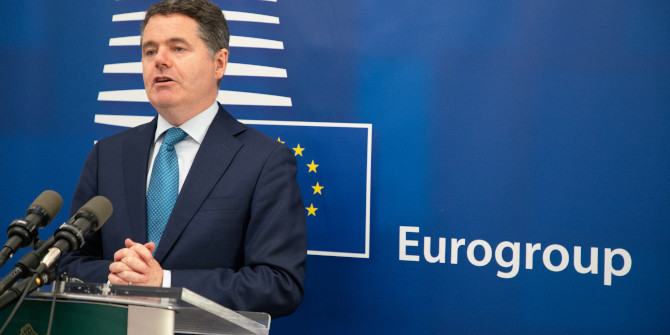The EU is frequently criticised for lacking democratic accountability. Mark Dawson and Adina Maricut-Akbik draw a distinction between ‘procedural accountability’, which focuses on whether actors follow the correct procedural steps in reaching a decision, and ‘substantive accountability’, which assesses the value of a policy decision itself. They argue there should be greater attention paid to the potential trade-offs associated with each approach, particularly in light of the notably procedural form of accountability that has been adopted in the EU’s Economic and Monetary Union.
Academic and political debates about accountability in the European Union tend to be frustrating. In many ways, we know what is wrong with democratic accountability in the EU and how to fix it. We are aware of the weak link between citizen preferences and the decisions of EU institutions and generally agree that the EU policy-making process requires more democratic control – either by increasing the role of parliaments in oversight or by empowering courts to prevent abuses of power. This search to ‘renew’ EU accountability has been given fresh impetus by ambitious reforms in the fiscal field such as the supposedly ‘Hamiltonian’ moment of the new European ‘Recovery and Resilience Facility’ (RRF).
Yet the complexity of the EU political system does not allow easy fixes. As a result, scholars and policy practitioners often discuss institutional reforms at the margins – for instance, the proposal to establish a subcommittee for Eurozone oversight in the European Parliament. The problem is not the lack of ideas about how to reform EU accountability, but that reform proposals cannot be easily implemented in the current institutional architecture. EU accountability seems to demand ‘dramatic’ rather than incremental change, yet the more dramatic the change, the less likely it is to come to pass.

Paschal Donohoe, Minister of Finance for Ireland and President of the Eurogroup, giving a press conference on 5 October 2020, Credit: Barry Cronin/European Council
Against this backdrop, we use a recent study to propose a new approach for evaluating accountability in the EU. We argue that we need to adapt our understanding of accountability in order to match the political system of the EU, a large-scale political unit in which citizens have few opportunities to influence governing decisions. Following Michael Goodhart, we advocate for a change of perspective, shifting the focus ‘from who is entitled to hold power to account to the reasons why accountability is justified in democratic theory’ (see p. 51). Our work thus raises a basic question: what is accountability good for? To take the example above, if citizens, parliamentarians or judges seek accountability for decisions under the RRF, what exactly are they seeking, and how can we distinguish between different varieties of such an accountability claim?
Drawing on liberal and republican political theory, legal scholarship, and the public administration literature, we identify four normative ‘goods’ that accountability is supposed to provide:
1. Openness. In political theory, openness is related to the idea that public confidence in official action will increase if public policy is conducted under the public gaze (what Bentham described as ‘publicity’). We might therefore want accountability because we see it as a device to ensure that public action is open, transparent, and contestable.
2. Non-arbitrariness. There are two dimensions here: on the one hand, the classical principal-agent perspective that those who wield public power should do so in a limited manner and that they should exercise coercion only to the degree necessary to achieve their goals; on the other hand, the legal perspective that public action should be limited by human rights or due process guarantees. Accountability – by making officials answer for conduct – provides a means by which arbitrary distinctions or applications of power can be identified, and later remedied.
3. Effectiveness. While openness and non-arbitrariness seem highly normative values, accountability may be sought for more utilitarian reasons, namely that accountable officials are more likely to deliver high-quality results. From this perspective, accountability holds the promise of performance. The premise here is that the need to justify and even correct conduct will likely improve the design of policy-making or implementation.
4. Publicness. This encompasses the idea that official action should be oriented towards the common good – and therefore justified by public or universal reasons. This involves demonstrating both that officials were not personally enriched and that their decisions are fairly balanced, taking into account different societal interests and perspectives.
Having established the normative goods of accountability, the question is how they can be delivered in practice. To concretise the four goods, we introduce the distinction between procedural and substantive accountability, borrowed from public law. Procedural accountability suggests an accountability relation oriented around the process by which a particular decision was rendered. If we are holding an actor to account procedurally, we are calling them to account for the procedural steps they undertook in forming or executing a policy decision. By contrast, if we are holding an actor to account substantively, we are calling them to account for the substantive worth of the policy decision itself. The distinction is applicable to different types of accountability forums: parliaments engaging in legislative oversight, courts conducting judicial review, or ombudsmen and courts of auditors performing administrative reviews.
We apply these theoretical insights to the EU’s Economic and Monetary Union (EMU). As pointed out before, the EMU is a major achievement of European integration but also one of its major democratic accountability challenges. In our view, the specific constitutionalisation of EMU in the Maastricht Treaty led to a predominance of procedural accountability, which produced several pathologies. Most problematically, there are dangers of a ‘replacement effect’ of procedures for substance and a consistently weak position of accountability forums vis-à-vis actors with expert knowledge such as the European Central Bank. Moreover, the difficulties associated with applying procedural accountability are laid bare when applied to ambitious projects such as the RRF, which has clear distributive implications.
Despite these limitations, we do not conclude that procedural accountability is of limited value universally. Its advantages are clarity and predictability, which make it an important avenue in providing accountability in EMU. However, without a substantive component, EMU accountability is likely to remain focused on processes of decision-making, which are insufficient for evaluating decisions in a policy field that is increasingly distributive in nature. Conversely, substantive accountability carries trade-offs in terms of its complexity and costs. The limited knowledge of forums seeking substantive accountability (such as judges and parliamentarians), and the need to allow economic discretion, remain constraining factors. Moreover, accountability forums need expertise in many fields to balance information asymmetries, implying high costs.
For these reasons, the choice for procedural or substantive accountability should in our view be political and revised at regular intervals. In other words, EMU’s political architects have to decide again if the costs of substantive accountability are worth the payoffs, or alternatively, if they are willing to accept the trade-offs that procedural accountability entails. The EU’s Hamiltonian turn may provide it with a further opportunity to re-evaluate its accountability choices.
For more information, see the authors’ accompanying paper in the Journal of European Public Policy
Note: This article gives the views of the authors, not the position of EUROPP – European Politics and Policy or the London School of Economics. Featured image credit: Barry Cronin/European Council





